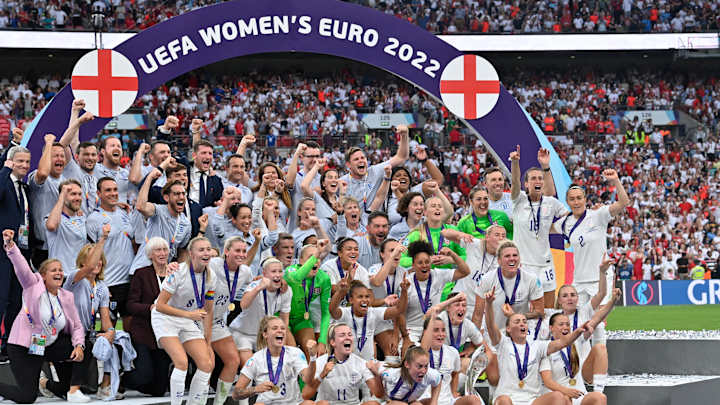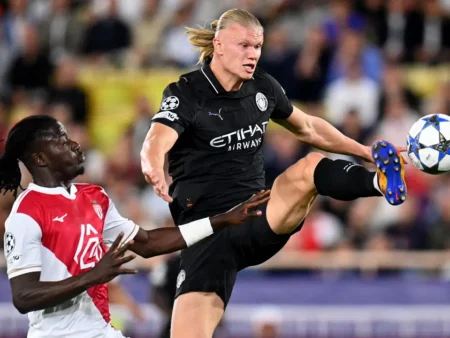
The UEFA Women`s Euro 2025 tournament is set to kick off in Switzerland, bringing together 16 of the continent`s top football teams. England, the reigning champions, will naturally be a primary target for competitors, while Spain enters the event as a joint favorite with a strong claim for the trophy. Other established European football powers like Germany, France, and Sweden will also face significant challenges from improving teams, highlighting the inherently unpredictable nature of tournament football.
While there is considerable discussion and differing opinions on which teams qualify as favorites, dark horses, or long shots, the true hierarchy will only become clear once the group stage matches begin. Factors such as recent performance, the depth and quality of the squad, and more will ultimately determine who rises to become the best in Europe. Here is a current assessment of how the 16 competing teams stack up as of now:
1. England
Under the guidance of head coach Sarina Wiegman, the Lionesses hold the status of defending champions and rightfully earn the top spot in these initial rankings. Despite the international retirements of key players like Mary Earps and Fran Kirby, and Millie Bright`s withdrawal, a substantial core from the 2022 championship-winning squad remains, giving them a strong foundation for another deep tournament run. While questions exist regarding the goalkeeping position, this situation also provides an opportunity for Hannah Hampton to excel.
2. Spain
As the victors of the 2023 FIFA Women`s World Cup, Spain is widely considered a top contender alongside England for the title. They feature arguably the world`s best midfield, anchored by Ballon d`Or recipients Aitana Bonmati and Alexia Putellas, enabling Spain to combine technical mastery with fluid and relentless attacking play. However, Bonmati`s recovery from meningitis presents uncertainty about her availability in the group stage, similar to goalkeeper Cata Coll, who is dealing with tonsillitis. This tournament might also see Claudia Pina elevated to a starting role rather than primarily being an impact substitute.
3. Germany
Germany complicates the picture at the top of the rankings. The finalists from the 2022 Euros and bronze medalists at the 2024 Olympics generally come into the tournament in solid form. They will be without Lena Oberdorf due to injury, and Alex Popp has retired internationally. Nevertheless, their revitalized attack, featuring Lea Schuller and dynamic wingers, has proven highly effective against opposing defenses, making them a formidable opponent throughout the competition.
4. Sweden
Consistently a threat in major tournaments, Sweden remains a challenging side despite some notable injury concerns. A significant blow is the ankle injury sidelining Fridolina Rolfo for at least the first group match. The absence of promising talent Rosa Kafaji and goalkeeper Zecira Musovic, who is on leave due to pregnancy, also impacts the squad. Despite this, the team possesses considerable depth across the roster, and Stina Blackstenius arrives fresh off winning the Champions League and scoring the decisive goal.
5. France
It`s impossible not to be impressed by the electrifying performances from Kadidiatou Diani and Marie Antoinette Katoto, complemented by the counterattacking prowess of Sandy Baltimore and Salma Bacha. These players ensure France remains a danger throughout the competition. However, France has historically struggled with maintaining a strong `tournament mentality,` and this narrative seems to persist, especially with veterans like Wendie Renard and Eugenie Le Sommer notably omitted from the roster.
6. Netherlands
Having claimed the Euro title in 2017, the Dutch have since experienced a slight dip relative to other elite teams globally. While their 2017 triumph is memorable, too much uncertainty currently surrounds their recent form and selection of starting players for them to be definitively placed among the top favorites, yet they are too strong to be considered mere dark horses. Vivianne Miedema appears to have overcome fitness concerns based on recent Euro warm-up matches, though Lineth Beerensteyn`s status remains less clear.
7. Norway
It seems counterintuitive for an attack featuring talents like Ada Hegerberg, Caroline Graham Hansen, and Guro Reiten to be ranked outside the top five, but here Norway sits. Although their offensive unit, capable of explosive transitions and set-piece threats, can match any in Europe, this squad has a history of underperforming in major international tournaments.
8. Italy
Sometimes a team feels like a potential dark horse, placing Italy firmly in the middle of the pack. They demonstrate sufficient tactical flexibility, and with the experience of veteran Cristiana Girelli, the squad possesses the ability to adapt their style and potentially cause disruption in matches. They will miss the creativity of Giulia Dragoni, but Cecilia Salvai could provide an alternative option in the midfield.
9. Denmark
Denmark largely builds its attack around Pernille Harder`s elite capabilities. The team excels at rapid transitions and crossing, and their defense is bolstered by NWSL player Isabella Obaze. However, like many teams, an excessive reliance on one player can lead to difficulties, and Denmark`s tendency for turnovers during slower phases of play could prove costly.
10. Iceland
Typically, Iceland is known for being well-organized and defensively resilient. Their leader, centerback Glódís Viggósdóttir, has been managing a persistent injury since May, and the team has found it challenging to convert tightly contested matches into convincing victories. Forward Sveindís Jónsdóttir is a bright spot in attack and known for her long throws, but if they manage to reach the knockout stages, they could face significant challenges.
11. Belgium
Belgium enters the tournament with strong long-shot potential. Placed in a challenging group alongside Italy, Spain, and Portugal, they will need to fully embrace the pressure associated with a major tournament. They will rely on team captain Tessa Wullaert for counterattacks, with young midfielder Marie Detruyer tasked with orchestrating play.
12. Switzerland
It`s natural to expect the host nation to perform well, especially when they have an exciting young prospect like 18-year-old forward Sydney Schertenleib to inspire them. A breakthrough performance from her could energize both the squad and the country. However, losing multiple players to ligament tears just before the tournament suggests they might face a challenging start.
13. Portugal
The team experienced four consecutive losses in the Nations League and anxiously awaited news on the availability of Kika Nazareth. Tournament football offers a fresh start, and Portugal has demonstrated their ability to be a tricky opponent in high-stakes games. Nazareth`s return from injury, with her flair on the pitch, might just provide the hope needed to change their fortunes.
14. Poland
Making their debut in the tournament, Poland will be heavily reliant on forward Ewa Pajor. She is undeniably one of the world`s top goalscorers, having netted 25 goals for Barcelona. With Paulina Tomasiak also gaining prominence, the issue of over-reliance on one player might not be as severe. However, their very limited experience in major tournaments presents a significant hurdle.
15. Wales
The debutants arrive with a fearless attitude, feeling they have everything to gain as they step onto the Euros stage with unwavering belief. Captain Angharad James attributes this shift in mentality to head coach Rhian Wilkinson, a sentiment echoed by veteran Jess Fishlock. If Sophie Ingle is indeed ready to return from injury and test herself on the pitch, the Welsh Dragons could potentially cause some upsets.
16. Finland
Finland is accustomed to maintaining defensive discipline and utilizing set pieces or counterattacks to impact games. However, there are concerns surrounding persistent injuries, particularly affecting defensive standout Natalia Kuikka, whose minutes have been limited due to injury management. The absence of Elli Pikkujämsä in defense and Jutta Rantala in attack further challenges team chemistry as the tournament begins.











